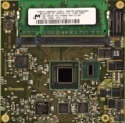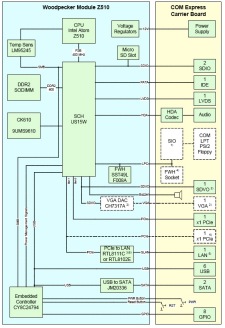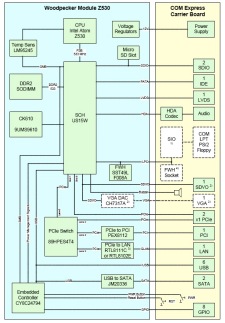Atom modules offer custom options
Oct 20, 2008 — by LinuxDevices Staff — from the LinuxDevices Archive — 1 views Toradex has announced a pair of COM Express modules based on Intel's Z5xx Atom processors. The Woodpecker Z530 and Z510 modules feature 1.6GHz or 1.1GHz CPUs, respectively, plus six USB 2.0 ports, gigabit Ethernet, dual SATA ports, and microSD slots, the company says.
Toradex has announced a pair of COM Express modules based on Intel's Z5xx Atom processors. The Woodpecker Z530 and Z510 modules feature 1.6GHz or 1.1GHz CPUs, respectively, plus six USB 2.0 ports, gigabit Ethernet, dual SATA ports, and microSD slots, the company says.
(Click here for a slightly larger view of Toradex's Woodpecker Z530)
While it doesn't suggest a target market for its new COM Express modules, Toradex says they offer “high performance computing with low power consumption.” The products can be used as a replacement for COM Express or ETXExpress modules from other manufacturers, the Swiss company adds.
Toradex's modules use Intel's by-now-familiar 1.1GHz Atom Z510 and 1.6GHz Z530 CPUs, paired, as ever, with the chipmaker's comparatively large SCH US15W companion chip. Thanks to the “Woodpecker Z530” and “Woodpecker Z510” monikers, of course, there's no confusion about which product is which.
Apart from clock speed, the modules are differentiated by the fact that the Z510 has a 400MHz frontside bus, and the Z530 has a 533MHz frontside bus. Since Intel lists TDPs of approximately two Watts for both Atoms, however, power consumption should be near-identical.


Block diagrams for Toradex's Woodpecker 510 (left) and Woodpecker 530 (right)
(Click either to enlarge)
As side-by-side comparison of the block diagrams above shows, the modules are otherwise quite similar. However, says Toradex, the Z530 has a PCI interface, and two PCI Express x1 interfaces. The Z510, on the other hand, has no PCI interface, and only one PCI Express x1 interface. Customers who need dual PCI Express x1 interfaces on the Z510 can order a “custom build” version that provides them, by deleting the module's LAN interface.
Another custom build option concerns both modules's video output. Normally, the devices include an LVDS video interface that supports flat panels up to 1366 x 768 pixels in size, and an SDVO interface that supports screens up to 1280 x 1024 pixels. By special order, SDVO can be replaced with an analog VGA output, says Toradex.
Both modules support up to 2GB of RAM, via a single SODIMM slot, and include a microSD slot for the addition of flash storage. Both devices also include gigabit Ethernet, dual SATA ports, a PATA interface for dual IDE drives, and six USB 2.0 ports.
Finally, the back of the modules, not pictured, includes not only the microSD slot and the two 220-pin COM Express connectors, but also a 30-pin FFC (flat flexible cable) connector. According to Toradex, the FFC connector provides access to two SDIO channels, suitable for connecting SD/MMC cards, wireless adapters, IrDA, RFID, or GPS modules.
Features and specifications listed by Toradex for the Woodpecker Z510 and Z530 include:
- Processor — Intel Atom Z510 (1.1GHz) or Z530 (1.6GHz)
- Memory — Up to 2GB of DDR2 RAM
- Storage — microSD slot
- Display — Supports LVDS and SDVO displays, or optional VGA
- Networking — gigabit Ethernet
- Other I/O:
- 6 x USB 2.0
- 2 x SATA
- 1 x PATA
- LPC
- SMB
- I2C
- 8 x GPIO
- 6 x USB 2.0
- Expansion:
- 2 x PCI Express x1 interfaces (Woodpecker Z530), 1 x PCI Express x 1 interface (Woodpecker Z510)
- 1 x microSD slot
- 2 x SDIO via FFC connector
- 2 x PCI Express x1 interfaces (Woodpecker Z530), 1 x PCI Express x 1 interface (Woodpecker Z510)
- Power supply — 8.5VDC to 24VDC for SBC; 12VDC for COM Express module
- Dimensions — 3.75 x 3.75 inches (95 x 95mm)
- Power requirement — 12VDC nominal
- Operating temperature — tbd
Toradex provided no information about operating system support for the Woodpecker modules. Because of the products' familiar processors and chipsets, however, support for Linux, Windows XP Embedded, and Windows Vista is likely.
According to Toradex, the devices will be sampling at the end of this month. Quantity one pricing for the Woodpecker Z530 is 169 Euros, and 119 Euros for the Woodpecker Z510, the company says.
Further information, including pricing for multiple units, may be available from the company's website, here.
This article was originally published on LinuxDevices.com and has been donated to the open source community by QuinStreet Inc. Please visit LinuxToday.com for up-to-date news and articles about Linux and open source.